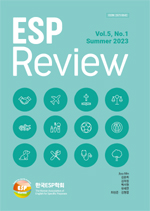Negotiation for meaning in learner-instructor interactions in an ESP course for expatriate employees
Negotiation for meaning in learner-instructor interactions in an ESP course for expatriate employees
- 한국ESP학회
- ESP Review
- Vol.5 No.1
-
2023.067 - 24 (18 pages)
-
DOI : 10.23191/espkor.2023.5.1.7
- 3

This study examines the strategies for meaning negotiation used in interactions between expatriate employees and their instructors during English for Specific Purposes (ESP) classes, and how the use of these strategies enhances their ESP learning. This qualitative case study involved three expatriate employees working in the United States and attending an online ESP program. Drawing on Long’s (1980) concept of negotiation for meaning, the study analyzed the communication that occurred between individual employees and their instructors in synchronous one-on-one online classes. The study identified six widely and commonly used strategies for negotiating meaning: clarification request, comprehension check, confirmation check, correction, repetition, and L1 use. Additionally, two other strategies, learning confirmation and knowledge expansion, were also confirmed. The study also found that the expatriate employees’ use of selected meaning negotiation strategies supported their English learning by promoting mutual understanding between them and their instructors. However, it was identified that the expatriate employees adopted different negotiation strategies depending on their English proficiency, and negotiation for meaning using those strategies did not always lead to successful English learning. Based on the results, this study suggests directions for future research.
Ⅰ. INTRODUCTION
Ⅱ. LITERATURE REVIEW
Ⅲ. RESEARCH DESIGN
Ⅳ. RESULTS
Ⅴ. CONCLUSION AND DISCUSSION
Ⅵ. LIMITATIONS
REFERENCES
(0)
(0)